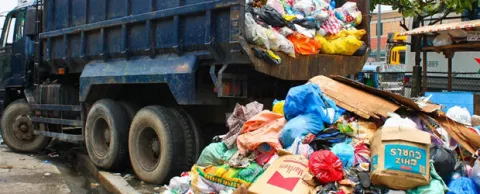
For many cities, it's a familiar story. Growth is a good thing. It means more and more people are attracted to your city. But it also means city governments need to come up with the resources to expand and improve services to meet the expectations of their new citizens – and it's not easy if the budget's already tight.
The story below describes what you might call a smart city "Do it yourself" pilot project at an Indian apartment complex for reducing the amount of waste that goes to a landfill. And while you might not think of Council Lead Partners Microsoft and IBM as being in the waste management business, they are – and they have ideas and tools you can use. — Doug Peeples
About 20 apartments in Kochi, a port city in India's state of Kerala, are converting garbage that otherwise would have been taken to a landfill into energy for use on-site. It's part of a bio-digester pilot project headed by the chief scientist at the Indian Institute of Chemical Technology (IICT).
The digester technology Johny Joseph developed can convert roughly 100 pounds of garbage into bio-gas which can be used as an energy source. Smaller digesters in use in Hyderabad are capable of handling a little over 50 pounds of garbage at a time, enough capacity to meet the needs of many of the apartments there. They are also being installed at a naval base in Delhi and one is in use at a restaurant near the IICT.
Funding for the project came from the Council of Scientific and Industrial Research, Ministry of New Renewable Energy, Department of Science and Technology.
As Joseph explained in an article in The Hindu, "There are four types of garbage disposal practices, including landfills, incineration, composting and anaerobic digestion. We are practicing the anaerobic digestion. Advanced engineering principles are applied to increase process efficiency and also to prevent operational difficulties."
How Microsoft's Redmond campus achieved "zero waste"
More than 40,000 employees work at Microsoft's 500-acre Redmond, WA campus. As Senior Director of Real Estate and Facilities Susan Wagner noted in a blog the campus has 33 cafés, 32 espresso cafés and more than 500 kitchenettes. In a way, it's a small city. And from July through December 2015, almost none of the food waste, packaging or food-related items were sent to a landfill.
How do they do it? Food packaging is compostable or recyclable. Meals are made from scratch on site and the company grows some of its vegetables at hydroponic farms at the campus. Cooking oil is converted into bio-diesel by recyclers. And suppliers minimize the amount of packaging for their deliveries or reclaim it.
That combined with employee-driven programs to recycle and compost and reuse earned the Redmond campus a Gold Level of Zero Waste Certification from the U.S. Zero Waste Business Council last year.
Another approach to waste reduction: data
IBM's global Smarter Cities initiative is intended to educate cities and companies in ways they can use data to improve their operations and work toward circular economy — an economy where waste is considered a resource of materials that can be re-purposed and reused. It also can be a new revenue stream.
The company's intelligent waste management framework is an informational platform that encompasses all aspects of waste management, from collection and processing to reuse. And the platform is geared to help cities and others achieve optimized operations that keep costs down but support sustainability through its IT solutions.
Mark your calendars for Smart Cities Week Silicon Valley...
Smart Cities Week Silicon Valley will bring together city leaders and technology innovators to explore trends and disruptive technologies for smart cities. The conference kicks off on Monday, May 8 with in-depth pre-conference workshops on crucial topics such as resilience and readiness. Click to learn more and register.
Doug Peeples is a Portland, Oregon-based writer specializing in technology and energy. Follow @smartccouncil on Twitter.



